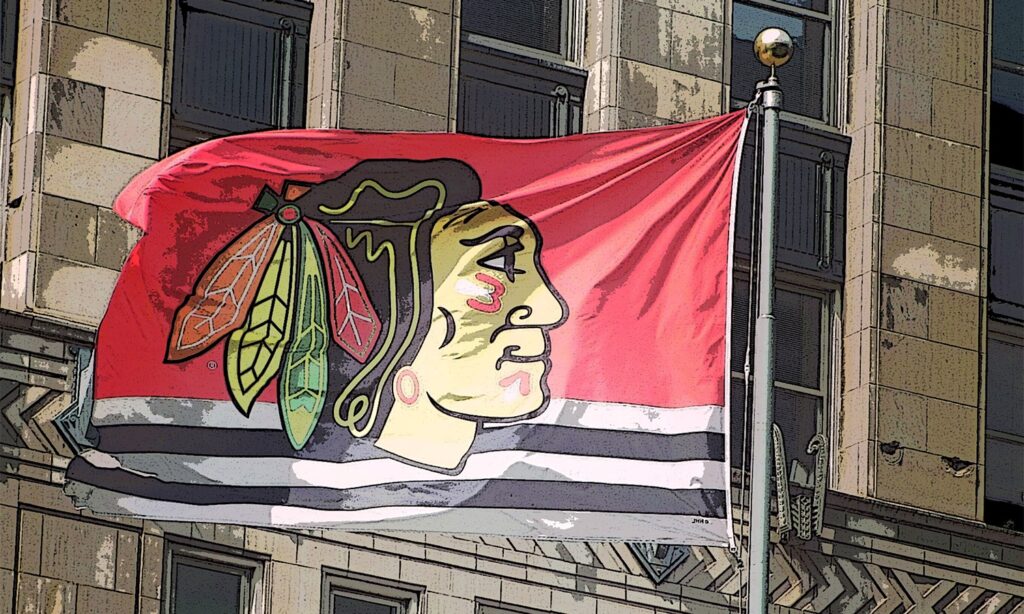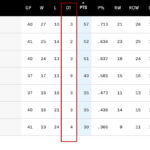In the early 2000’s, the NHL put a moratorium on league expansion. The league focused on making the product more exciting to fans back then.
We saw overtime games shift to 3-on-3 format and the addition of shootouts to settle all tie scores during the regular season.
The NHL also clamped down on clutching and grabbing from the previous era.
This helped players better display their talent and increased scoring in the league.
The only team to relocate during this period was the Atlanta Thrashers, acquired by Winnipeg in 2011 and renamed the Jets.
When league profits steadily grew year over year between 2000-2017, it was time for the NHL to take the next step.
In 2017-18 season, we would witness another expansion team join the fray. This time, it was the turn of the Vegas Golden Knights to make a splash.
And they did just that by reaching the Stanley Cup Finals in their very first year – the only team in NHL history to do so.
Next came the Seattle Kraken (2021-22), which brought the league to new heights. We’ve reached the highest franchise count the league has ever seen.
Continue reading to find out what that number is…
How Many NHL Teams are there?
There are 32 NHL teams with the addition of the Seattle Kraken in the 2021-22 season. The Kraken was assigned to the Pacific division in the Western Conference. As a result, the Arizona Coyotes were relocated to the Central division, splitting the four divisions equally into 8 teams.
When the NHL first emerged in 1917, there were only 4 teams.
That same year, the team count decreased to 3 as the Montreal Arena burned down and left both the Canadiens and Wanderers homeless.
While the Canadiens were able to relocate to the Jubilee Rink, the Wanderers’ owner ultimately chose to disband the team.
The NHL returned to 4 teams in the 1919-20 season with the addition of the Quebec Athletics, which eventually became the Tigers when the team moved to Hamilton the following season.
The league expanded to 6 teams in the 1924-25 season with the addition of the Montreal Maroons and Boston Bruins.
By 1925-26, the league added 2 more American teams while dropping the Hamilton franchise, totalling 7 teams.
Between 1926 and 1942, the league maintained between 7-10 NHL teams each year. During this period, we witnessed certain teams sit out the season while others underwent name changes.
In the end, the league added several US franchises to the still standing Canadiens and Maple Leafs franchises. The teams that survived passed 1942 were ultimately known as the Original Six.
Original Six Era (1942-67)
The 1942-43 season saw the league drop down to 6 teams, known as the Original Six.
These six teams consisted of the Montreal Canadiens, Toronto Maple Leafs, Chicago Blackhawks, Boston Bruins, Detroit Red Wings and the New York Rangers.
For the next 25 years, there would be no new team additions or subtractions. The same six teams would play each other for the Stanley Cup year-in, year-out.
Keep in mind that only four of the 6 teams made the playoffs each season.
This period of time was even dubbed as the Original Six Era.
Expansion Era (1967-92)
It wasn’t until 1967 that the league would expand again. That year, the league doubled in size to 12 teams.
The new franchises added were the Los Angeles Kings, Minnesota North Stars, Oakland Seals, Philadelphia Flyers, Pittsburgh Penguins, and St. Louis Blues.
All but the Minnesota North Stars and Oakland Seals still exist today.
The Oakland team relocated at one point to Cleveland and then merged with the Minnesota franchise.
The North Stars eventually moved to Dallas in 1993 and dropped the “North” in “North Stars”.
A new Minnesota franchise emerged in the 2000-01 season and was named the Minnesota Wild. They remain part of the 32 teams that exist today.
The expansion era finally ended in 1992, with a total of 22 NHL teams from coast to coast.
Aside from the Minnesota North Stars, both the Hartford Whalers and Quebec Nordiques no longer remain active NHL franchises (from this period).
The Whalers went on to become the Carolina Hurricanes (1997-98), while the Nordiques moved to Colorado (1995-96) and renamed as the Avalanche.
Both teams proved to be highly successful, winning 3 Stanley Cups combined within the first 10 years of their existence.
How Many NHL Teams are in Canada?
There are currently 7 Canadian teams in the NHL.
The Winnipeg Jets were the most recent team to rejoin the NHL in 2011-12.
In case you didn't know, Winnipeg had a team from 1979-96. They were also called the Jets, but were then relocated to Arizona for the 1996-97 NHL season.
Furthermore, Arizona renamed the team to the Phoenix Coyotes.
The Jets name became vacant again for any future takers.
So, when Winnipeg acquired the Atlanta Thrashers in 2011, the city restored the original team team - the Jets.
Note that the Thrashers only lasted as a franchise for 12 seasons, between 1999-2011.
The team had lost $130 million USD in the last 6 seasons and was looking for a suitor to purchase the franchise.
While the owner tried to keep the franchise in Atlanta, he finally settled on selling it to the True North Sports & Entertainment group.
The rest is now history and the Winnipeg Jets team was revived.
Will Canada Get Another NHL Team?
Since the NHL decided to expand from 30 to 32 teams, Quebec City had expressed serious interest in rejoining the league.
Unfortunately, the NHL ultimately decided to award franchises to Las Vegas and Seattle instead.
There’s been also discussion to expand further to 34 teams, and again Quebec is being discussed.
At the same time, Houston is looking to possibly join as well. (source)
How Many Teams in NHL History?
Since 1917, a total of 50 teams existed in NHL history.
From this list, 19 franchises either dissolved or relocated. The Winnipeg Jets are the only team to relocate and eventually rejoin the league.
See the list of current and former NHL teams.
NHL Teams in Alphabetical Order (ACTIVE)
| Team Name | Years Active | Notes | |
|---|---|---|---|
| 1 | Anaheim Ducks | 1993 - Present | Known as the Anaheim Mighty Ducks from 1993-2006 |
| 2 | Arizona Coyotes | 1996 - Present | Formerly the Winnipeg Jets from 1979-96 |
| 3 | Boston Bruins | 1924 - Present | |
| 4 | Buffalo Sabres | 1970 - Present | |
| 5 | Calgary Flames | 1980 - Present | Formerly the Atlanta Flames from 1972-80 |
| 6 | Carolina Hurricanes | 1997 - Present | Formerly the Hartford Whalers from 1979-97 |
| 7 | Chicago Blackhawks | 1926 - Present | Team name spelled Black Hawks from 1926-96 |
| 8 | Colorado Avalanche | 1995 - Present | Formerly the Quebec Nordiques from 1979-95 |
| 9 | Columbus Blue Jackets | 2000 - Present | |
| 10 | Dallas Stars | 1993 - Present | Formerly the Minnesota North Stars from 1967-93 |
| 11 | Detroit Red Wings | 1926 - Present | Known as Detroit Cougars from 1926-30 Known as Detroit Falcons from 1930-32 |
| 12 | Edmonton Oilers | 1979 - Present | |
| 13 | Florida Panthers | 1993 - Present | |
| 14 | Los Angeles Kings | 1967 - Present | |
| 15 | Minnesota Wild | 2000 - Present | |
| 16 | Montreal Canadiens | 1917 - Present | |
| 17 | Nashville Predators | 1998 - Present | |
| 18 | New Jersey Devils | 1982 - Present | Formerly the Kansas City Scouts from 1974-76 Formerly the Colorado Rockies from 1976-82 |
| 19 | New York Islanders | 1972 - Present | |
| 20 | New York Rangers | 1926 - Present | |
| 21 | Ottawa Senators | 1917-34 1992 - Present | Relocated to St. Louis and renamed Eagles in 1934 |
| 22 | Philadelphia Flyers | 1967 - Present | |
| 23 | Pittsburgh Penguins | 1967 - Present | |
| 24 | San Jose Sharks | 1991 - Present | |
| 25 | Saint-Louis Blues | 1967 - Present | |
| 26 | Seattle Kraken | 2021 - Present | |
| 27 | Tampa Bay Lightning | 1992 - Present | |
| 28 | Toronto Maple Leafs | 1917 - Present | Known as Toronto Arenas from 1917-19 Known as Toronto St. Patricks from 1919-27 |
| 29 | Vancouver Canucks | 1970 - Present | |
| 30 | Vegas Golden Knights | 2017 - Present | |
| 31 | Washington Capitals | 1974 - Present | |
| 32 | Winnipeg Jets | 1979-96 2011 - Present | Original Jets team moved to Arizona in 1996 Rejoined the league in 2011 after purchasing franchise from the Atlanta Thrashers |
Former, Defunct and Relocated NHL Teams
| Team Name | Years Active | Notes | |
|---|---|---|---|
| 1 | Atlanta Flames | 1972-80 | Relocated to Calgary |
| 2 | Atlanta Thrashers | 1999-2011 | Relocated to Winnipeg and renamed Jets |
| 3 | Brooklyn Americans | 1925-42 | Defunct |
| 4 | California Golden Seals | 1967-76 | Relocated to Cleveland and renamed Barons |
| 5 | Cleveland Barons | 1976-78 | Defunct; merged with Minnesota North Stars |
| 6 | Colorado Rockies | 1976-82 | Relocated to Cleveland and renamed Devils |
| 7 | Hamilton Tigers | 1920-25 | Defunct |
| 8 | Hartford Whalers | 1979-97 | Relocated to Carolina and renamed Hurricanes |
| 9 | Kansas City Scouts | 1974-76 | Relocated to Colorado and renamed Rockies |
| 10 | Minnesota North Stars | 1967-93 | Relocated to Dallas and renamed Stars |
| 11 | Montreal Maroons | 1924-38 | Defunct |
| 12 | Montreal Wanderers | 1917-18 | Defunct |
| 13 | Ottawa Senators | 1917-34 | Relocated to St. Louis and renamed Eagles |
| 14 | Philadelphia Quakers | 1930-31 | Defunct |
| 15 | Pittsburgh Pirates | 1925-30 | Relocated to Philadelphia and renamed Quakers |
| 16 | Quebec Bulldogs | 1919-20 | Relocated to Hamilton and renamed Tigers |
| 17 | Quebec Nordiques | 1979-95 | Relocated to Colorado and renamed Avalanche |
| 18 | St. Louis Eagles | 1934-35 | Defunct |
| 19 | Winnipeg Jets | 1979-96 | Relocated to Arizona and renamed Coyotes |
Final Thoughts
It took the NHL many years to achieve the stability and growth of today.
With 32 teams currently active, the divisions are split perfectly.
Those divisions are named the Metropolitan, Atlantic, Central and Pacific. They are each made up of 8 teams. You can view the structure in the NHL Standings.
Furthermore, half the NHL franchises (16) get to participate in the Stanley Cup Playoffs, while the other teams battle for the next top prospect.
With a salary cap in place, teams can choose to rebuild through youth development or take aim at the Stanley Cup with an experienced roster for several years.
But the idea is to keep enough teams in the playoff hunt to maximize league profits.
The NHL standings and point system were designed to make playoff races that much tighter.
If you want to learn more, make sure to check out my blog post on Hockey Standings Explained Column by Column.
And simply enough, teams competing for a playoff spot will draw out more fans to their venues.
And there's nothing like seeing a bubble team make that Cinderella run for the cup.






